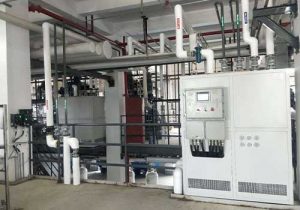application of chiller
Application of Chiller: A Comprehensive Guide
Introduction
Chillers are essential cooling systems used in a wide range of industries and applications to maintain optimal temperatures for processes, equipment, and environments. By removing heat from a liquid, typically water or a water-glycol mixture, chillers ensure efficient and reliable cooling. This article explores the various applications of chillers, their working principles, types, and benefits, emphasizing their critical role in modern industrial and commercial operations.

Working Principles of Chillers
Chillers operate on the principles of the refrigeration cycle, which consists of four main stages:
Compression: The refrigerant is compressed by the chiller’s compressor, increasing its temperature and pressure.
Condensation: The high-pressure refrigerant flows to the condenser, where it releases heat to the cooling medium (air or water) and condenses into a liquid.
Expansion: The liquid refrigerant passes through an expansion valve, reducing its pressure and temperature.
Evaporation: The low-pressure refrigerant enters the evaporator, where it absorbs heat from the liquid to be chilled, causing the refrigerant to evaporate.
The chilled liquid is then circulated to absorb heat from the desired area or process, and the cycle repeats.
Types of Chillers
Air-Cooled Chillers:
Cooling Medium: Air
Applications: Suitable for smaller installations or areas with limited water supply.
Advantages: Lower installation costs, easier maintenance.
Water-Cooled Chillers:

Cooling Medium: Water
Applications: Ideal for large-scale industrial processes requiring high cooling capacity.
Advantages: Higher efficiency, better performance in high-temperature environments.
Absorption Chillers:
Cooling Medium: Heat energy (e.g., steam or waste heat)
Applications: Used in industries with excess heat or steam.
Advantages: Energy-efficient and environmentally friendly.
Applications of Chillers
Industrial Manufacturing:
Purpose: Cool machinery and equipment to prevent overheating and ensure consistent performance.
Examples: Plastic injection molding, metal plating, and laser cutting.
Food and Beverage Processing:
Purpose: Maintain precise temperatures during production and storage.
Examples: Brewing, dairy processing, and meat packaging.
Pharmaceuticals:
Purpose: Ensure stable conditions for drug manufacturing and storage.
Examples: Vaccine production, tablet coating, and laboratory research.
HVAC Systems:
Purpose: Provide efficient cooling for large buildings and industrial facilities.
Examples: Office buildings, shopping malls, and hospitals.
Data Centers:
Purpose: Maintain optimal temperatures for servers and IT equipment.
Examples: Cloud computing facilities, server rooms, and network operations centers.
Medical and Healthcare:

Purpose: Regulate temperatures in medical equipment and facilities.
Examples: MRI machines, blood banks, and surgical suites.
Benefits of Using Chillers
Precise Temperature Control: Ensures optimal conditions for sensitive processes and equipment.
Energy Efficiency: Modern chillers are designed to minimize energy consumption.
Reliability: Provides consistent and reliable cooling performance.
Scalability: Can be easily expanded to meet increasing cooling demands.
Versatility: Suitable for a wide range of applications and industries.
Maintenance and Optimization
Regular Inspections: Check for leaks, corrosion, and wear in components.
Water Treatment: Prevent scaling, fouling, and biological growth in the cooling system.
System Upgrades: Implement energy-efficient technologies, such as variable speed drives and advanced controls.
Performance Monitoring: Use sensors and software to track system performance and identify issues early.
Conclusion
Chillers are indispensable in various industries and applications, providing efficient and reliable cooling solutions. By understanding their working principles, types, and benefits, businesses can optimize their cooling systems and ensure long-term reliability. Whether for industrial manufacturing, food processing, pharmaceuticals, or HVAC systems, chillers play a crucial role in maintaining optimal temperatures and supporting critical processes.
Related recommendations
temperature control heating and cooling
580Temperature Control for Heating and Cooling: A Comprehensive Guide IntroductionTemperature control systems for heating and cooling are vital in maintaining optimal conditions across various env...
View detailswater cooling system for industry
200Components of Industrial Water Cooling SystemsCooling TowerIn many industrial water cooling systems, especially open-loop systems, the cooling tower is a central component. It is responsible for...
View detailsgas refrigeration
407IntroductionGas refrigeration is a crucial area within the field of refrigeration technology. It plays a significant role in various industries and applications due to its unique characteristics a...
View detailsHow to Choose a High Temperature Glass Circulating Oil Bath?
1154How to Choose a High Temperature Glass Circulating Oil Bath? The high-temperature glass circulating oil bath is suitable for the equipment connected to the reaction device of the refrigerati...
View details
 LNEYA Chiller
LNEYA Chiller






HelloPlease log in